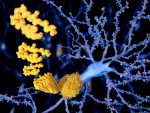Alzheon Fully Enrolls Phase 2 Biomarkers Study of Oral ALZ-801
Written by |

Robert Kneschke/Shutterstock
Note: This story was updated July 7, 2021, to reflect that patients with two copies of the APOE4 gene are heterozygous and that the study will measure biomarkers in blood plasma.
Patient enrollment is now complete for Alzheon’s Phase 2 clinical trial evaluating the effects of ALZ-801 on disease-related biomarkers in people with early Alzheimer’s. All the participants — double the original target number — have a specific genetic variant associated with an increased risk of disease progression.
Alzheon said it expects the first interim data from the study to be released in 2022.
The enrollment target of 80 participants was expanded from its original number of 40 patients to strengthen the statistical power, or the probability of finding an effect of ALZ-801 on biomarkers of Alzheimer’s disease — if there is an effect to be found.
“Our ability to not only meet but double the patient enrollment target in the Phase 2 biomarker trial, and complete enrollment ahead of schedule, reflects the desire among Alzheimer’s patients and their caregivers for a safe, effective and convenient oral treatment,” Martin Tolar, MD, PhD, Alzheon’s founder, president, and CEO, said in a press release.
ALZ-801 is an oral anti-oligomer agent — a medication that prevents the formation and clustering of harmful proteins, such as beta amyloid and tau, that play a key role in Alzheimer’s disease. It has been given fast track status by the U.S. Food and Drug Administration (FDA) to support and speed its development.
While there is no single cause of Alzheimer’s, genetics are known to play a role in disease risk and progression, with certain genetic variations in the apolipoprotein E gene (APOE) linked to increased risk. In particular, one APOE variant, known as the ε4 allele or APOE4, has been associated with an increased risk of Alzheimer’s, as well as with a higher risk of rapid disease progression. Estimates place around a quarter of all patients as having at least one copy of APOE4.
It is thought that people carrying two copies of APOE4 — known as homozygotes, who make up around 15% of all people living with Alzheimer’s — may benefit the most from an anti-amyloid therapy like ALZ-801.
The Phase 2 biomarker study (NCT04693520) is evaluating the safety and efficacy of 265 mg ALZ-801 tablets. These tablets are given once daily for two weeks and twice daily thereafter to people with early Alzheimer’s who have either one (heterozygous) or two copies of APOE4. The trial is being conducted at sites in the Czech Republic and the Netherlands.
The main goal of this biomarker study is to describe the biomarker profile of a broader population — those with one or two copies of APOE4 — and thereby guide future Phase 3 studies. This could expand the target population for ALZ-801 to up to two-thirds of all people with Alzheimer’s disease.
Levels of these biomarkers will be measured in blood plasma and in the cerebrospinal fluid, which is the fluid that circulates in the brain and spinal cord. MRI imaging-based biomarkers also will be assessed, and participants will undergo regular cognitive assessments.
“This ground-breaking biomarker study focusing on a well-defined genetic population is a first of its type—enabling us to apply the newest advances in Alzheimer’s fluid biomarkers, and to correlate them with clinical and imaging endpoints, as we build the strongest data package to confirm the disease modifying profile of ALZ-801 and support regulatory approval,” Tolar said.
“By expanding ALZ-801’s target patient population beyond APOE4/4 homozygotes, we have the unique opportunity to go from helping 1.35 million patients in ALZ-801’s first indication to potentially benefiting more than 15 million Alzheimer’s patients globally,” he said.
Tolar noted that ALZ-801 is a first-in-class Phase 3 oral drug with a favorable safety profile. Alzheon hopes that it may not only slow, but also stop the progression of Alzheimer’s — “with the advantage of an oral tablet compared to the infusions required for antibody treatments,” Tolar added.
ALZ-801 also is being studied in the ongoing APOLLOE4 Phase 3 study (NCT04770220), which began dosing patients last month. The therapy’s efficacy and safety are being evaluated in Alzheimer’s patients who have two copies of APOE4. The trial is currently recruiting and more information can be found here.






